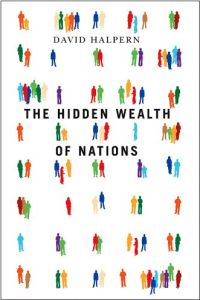Únase a getAbstract para acceder al resumen.

Únase a getAbstract para acceder al resumen.
David Halpern
The Hidden Wealth of Nations
Polity Press, 2009
¿De qué se trata?
Trust, happiness and other forms of human capital constitute the “hidden wealth of nations.”
Recommendation
Trust, happiness and other forms of human capital constitute the “hidden wealth of nations.” This reciprocal, relationship-based “economy of regard” is a reservoir of unseen assets that parallels the transaction-based economy. Insights from behavioral economics and survey-based measurements of citizens’ satisfaction can help governments perform more effectively. British psychologist David Halpern’s verbose, disjointed writing style may obscure some of his insights on increasing society’s well-being, but his comments are fresh and interesting. While always politically neutral, getAbstract recommends his treatise to those interested in public service and inventive approaches to democratic governance.
Summary
About the Author
British psychologist and civil servant David Halpern runs Behavioural Insights Limited, a company – initially launched as part of the UK government – that applies behavioral economic theory to improve public policy and make government more efficient.

















Comment on this summary